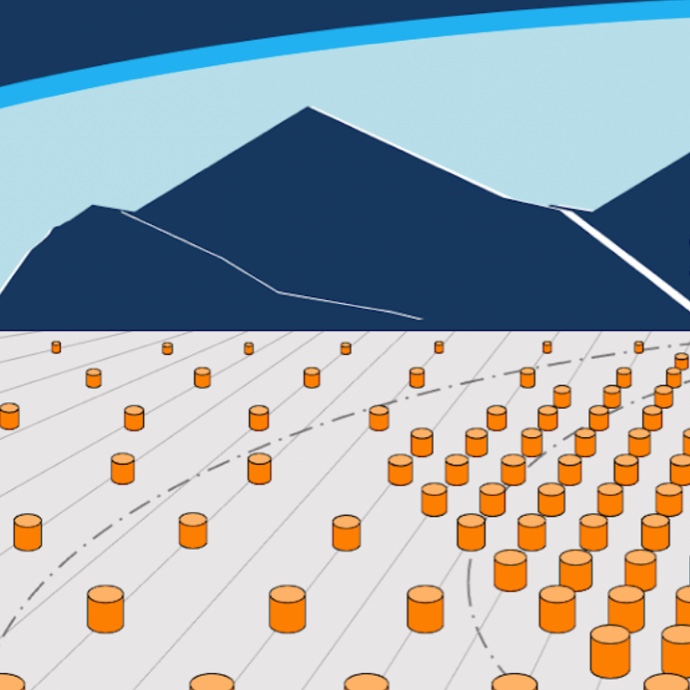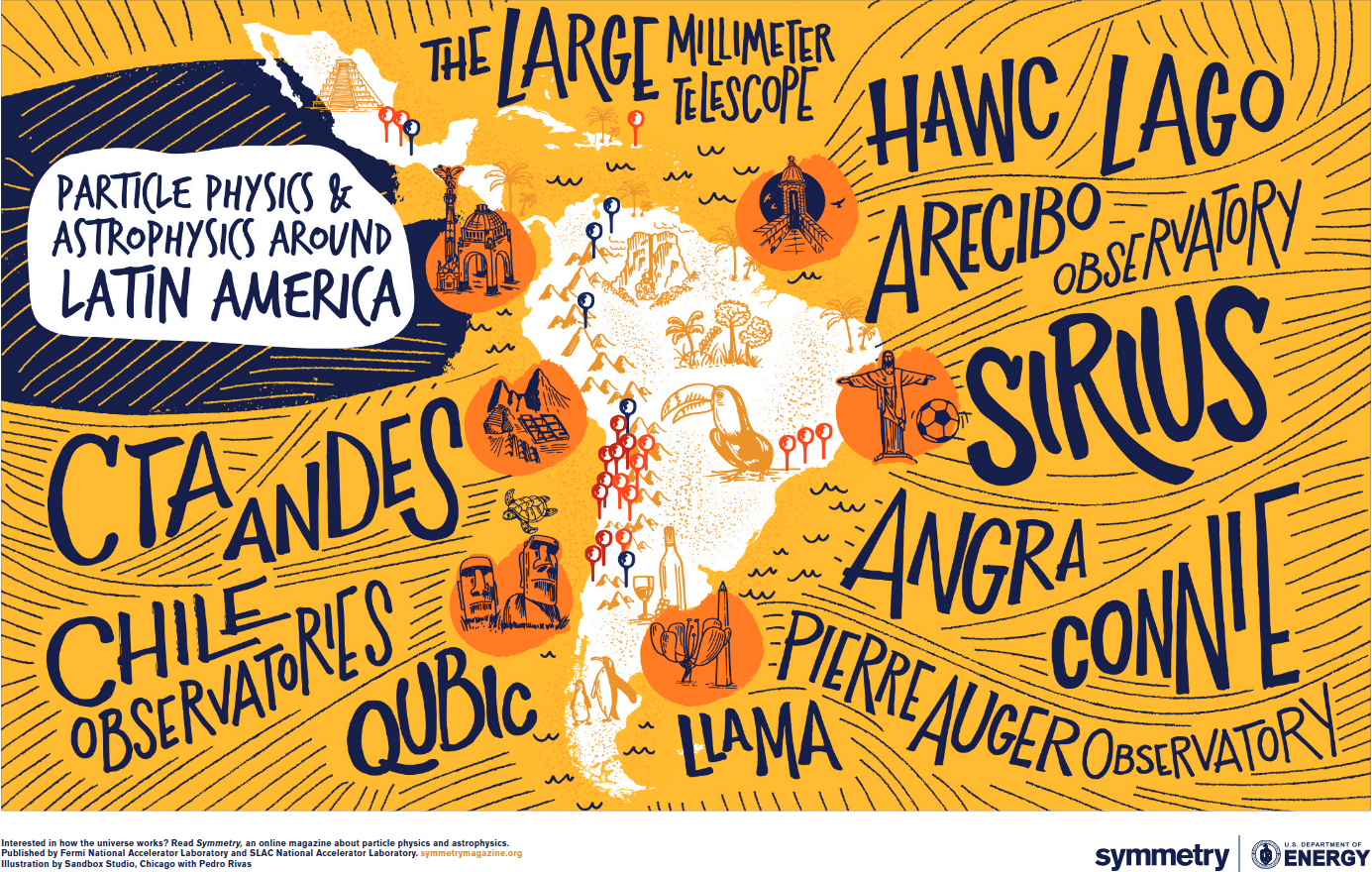Contact: claf_astroparticulas@cbpf.br
Context
The successful observation of the sky at the highest energies (from 10 GeV to 10 PeV) with ground-based gamma-ray instruments is one of the greatest breakthroughs of Astroparticle Physics research in the past two decades. Currently, we are experiencing the transition to a new generation of instruments that promises to guide the field towards major future discoveries. These are global efforts to carry out large projects focused on the development of the observational techniques and to further explore the scientific potential of observations in the very- to ultra-high energy domains.
Latin America plays a central role as the prime geographic region for the installation of world-class ground-based gamma-ray experiments in the Southern Hemisphere. The continent has been recently chosen to host the southern site of the Cherenkov Telescope Array (CTA), in Chile, and selected as the continent for installation of the future Southern Wide-Field Gamma-ray Observatory (SWGO), following the presence of HAWC in Mexico. It also plays a long-standing leading role in the field of ultra-high-energy cosmic-rays, through the Pierre Auger Observatory (PAO), in Argentina, which is currently undergoing an upgrade. The continent is therefore about to concentrate the most important contingent of leading experiments in the field worldwide.


Latin America has a strong and consistent tradition of research in cosmic rays and astroparticle physics at an international level, a field responsible for decades of pioneering development of the physical sciences in the region, through the work of scientists such as Manuel Sandoval Vallarta (1899-1977), Guido Beck (1903-1988), Cesar Lattes (1924-2005), Luis Masperi (1940-2003), Ronald Shellard (1948-2021) and Juan Gualterio Roederer. Over the past decades, many groups dedicated to research on astroparticle physics have emerged in various Latin American countries and are today consolidated as important contributors to some of the most important international experiments in the field. As the region prepares to host the next generation of leading gamma-ray facilities, the field is once again uniquely placed to help lead the scientific development of the region.
Despite this long tradition and favorable context, the degree of direct regional collaboration among the various groups working in the field is, nevertheless, below what would be desirable or expected for an optimal integration, impact, and sustainable expansion of the field in the continent. A particular drawback has been that, for most countries, national groups face difficulties in maintaining effective participation in large collaborative experiments and initiatives hosted in other countries of the continent. This represented a missed opportunity for improved regional scientific integration and development, continued training of local human resources, and the consequent nucleation of new groups, as well as a greater involvement of the regional industry in the technological innovations that accompany these major international endeavors.
The CLAF Astroparticle Physics Unit is constituted by Latin American research groups involved in the major international experiments hosted in the continent. In particular, it has an initial focus on the preparation for the future installation of SWGO, a project with a large contingent of direct Latin American involvement and with a special potential for the development of the field in the region. It is nevertheless open to, and welcomes the participation of, groups involved in all Astroparticle Physics experiments of the continent.
Objectives
The principal objective of the CLAF Astroparticle Physics Unit is to promote collaborative research and the joint training of physicists capable of scientifically exploiting the major Astroparticle Physics experiments and facilities in the continent. It is expected that the work of the Unit will contribute to create stable collaborative bridges between the participating groups. Outreach tasks aimed at disseminating the practices and achievements of the field to society, in order to sustain and promote STEM education, is another important aspect of its goals. It should also promote and leverage participation by research groups from Latin America in the major experiments of the field hosted in the continent.
Research on Astroparticle Physics is multidisciplinary in nature and requires cooperation on various topics, from theory to instrumentation, which are hard to find in individual groups or even within single countries of the region. Beyond the simple scientific exploitation of the experiments, research in Astroparticle Physics can contribute to the development of advanced instrumentation and sophisticated computing techniques, with a perspective of impact that goes beyond the field itself, and even beyond academia.
CLAF, as a UNESCO-recognised international organization dedicated to the promotion of physics research in Latin America, is the ideal organism to achieve these goals. It is clear that each particular local reality requires appropriate specific actions so that international scientific cooperation can develop in a sustainable manner and as an answer to local needs and objectives.
A context of top-quality scientific research is the basic foundation from which such long-term actions can draw justification and evolve in a sustainable way. In the case of Astroparticle Physics, this is provided by the various world-leading experiments that the continent already hosts or is about to host, among which emphasis is given, initially, to SWGO, for its unique potential of a large-scale direct Latin American involvement.
The initial set of tasks to be developed by the CLAF Astroparticle Physics Unit will therefore consider the needs of the Latin American groups towards the preparation for the future SWGO, aiming at securing an effective and sustainable long-term involvement of all interested countries in the project, and exploiting its context to increase the regional integration, direct collaboration, as well as general development of the field as a whole.
In all of these long-term major experiments, there is ample potential for involvement of the industrial sector, and the Unit should carry out targeted actions to support the involvement of the local industry in the development of technologies and towards its direct participation in the construction of the experiments.
Plan of Activities
The CLAF Astroparticle Physics Unit aims to play a key role in the development of Astroparticle Physics in the region, motivated by and in partnership with the leading international experiments under development in the region, thus becoming a central point that coordinates and multiplies the efforts made in this field by the various Latin American institutions.
The CLAF Astroparticle Physics Unit is coordinated by a steering committee formed by active representatives of the various participating institutes and experiments, to discuss and carry out the proposed action items.
As part of its plan of activities, the CLAF Astroparticle Physics Unit will
Additionally, given the expectations for the start of construction of SWGO in the next few years, actions will be carried out to secure the long-term participation of all countries currently involved in the Project, in particular after site selection.
In this context, a series of events are planned for the next years, covering all the relevant themes associated with the long-term involvement of the groups in large collaborative projects such as SWGO, in order to help prepare countries and institutions to effectively engage in the Project once construction and operation start.
The coming year of 2024 marks the centenary of Cesar Lattes, father of Astroparticle Physics in Latin America, and a workshop to commemorate the date is foreseen.
National focal points
Argentina: Adrian Rovero, Instituto de Astronomia y Física del Espacio (IAFE) - rovero@iafe.uba.ar
Bolivia: Pedro Miranda, Universidad Mayor de San Andres (UMSA) - pmiranda@fiumsa.edu.bo
Brasil: Ulisses Barres de Almeida, Centro Brasileiro de Pesquisas Físicas (CBPF) - ulisses@cbpf.br (chair)
Chile: Claudio Dib, Universidad Tecnica Federico Santa Maria (UTFSM) - claudio.dib@usm.cl
Colombia: Luiz Núñez, Universidad Industrial Santander (UIS) - lnunez@uis.edu.co
México: Andres Sandoval, Universidade Nacional Autónoma de México (UNAM) - asandoval@fisica.unam.mx
Peru: Luis Otiniano, Agência Espacial de Peru (CONIDA) - lotiniano@conida.gob.pe
Eventos
CLAF-MCTI High-Level Meeting
Opportunities for the Latin-American Participation and Cooperation in Astro-particle Physics and the Project SWGO